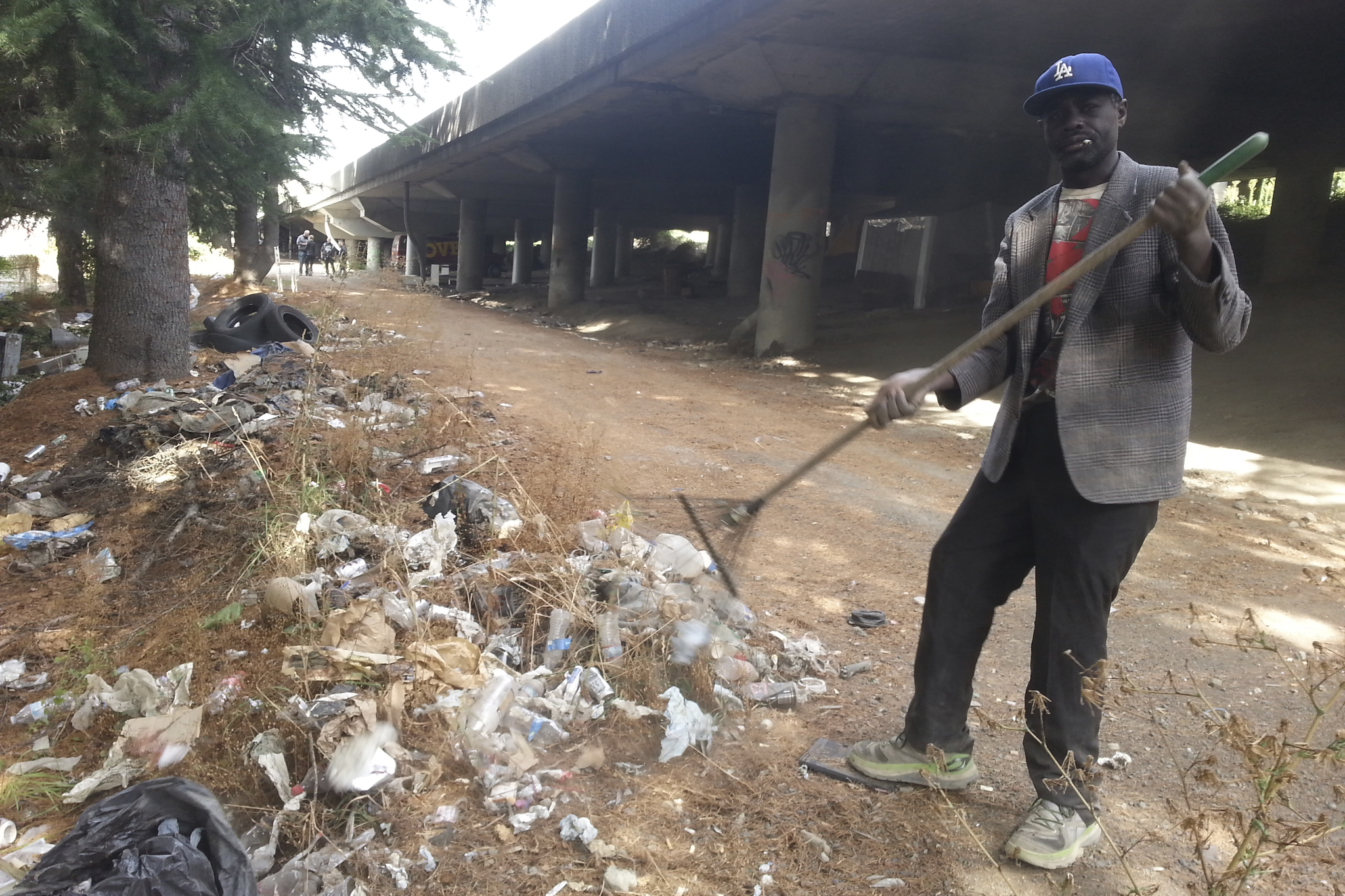Near the rollercoaster-like intersection of I-90 and I-5 in central Seattle lays a hilly strip of grassland. A gigantic concrete highway onramp erupts from the hill’s earthen guts like the tusk of some fantastically large mammoth. Traffic hums and buzzes and grunts from all sides; commuters drive past, oblivious. Clustered beneath and beside the great tusk as though congregating in worship are tents and humans of every size and color.
Welcome to the Field. Unlike the adjacent underbelly of I-5, aka the Jungle, the Field lays naked beneath the open sky. Most of its campers are emigrants from the Jungle who fled under impending threat of eviction by city and state authorities. Police swept the Field itself as recently as January. Now, as a stopgap measure for storing those emigrants, the Field is where authorities evict homeless campers to. Yet unlike the city contractor-run encampments in Ballard, SoDo and Interbay, the Field isn’t formally sanctioned. It exists in a legal gray space, endorsed by city leaders in fact but not word.
And they’ll soon be sending more. According to the Seattle Times, on Friday city and state officials served notice to the 40 or so campers it says remain in the Jungle. (Previously, its population was in the hundreds.) The deadline for leaving is October 11. Union Gospel Mission, which is doing outreach in the Jungle in preparation for that eviction and cleanup, said last week that there are currently about 85 campers in the Field, with room for perhaps 20 more. UGM says it visits daily with emergency water and food supplies, while Seattle provides portable toilets and trash removal services.
Resident Jerry Dean says that moving into the Field from the Jungle has been a boon to him. “In the Jungle, it was infested by rats,” he says. “We didn’t have a way to dump our garbage, or porta potties or anything.” Now he enjoys the twin luxuries of commode and garbage removal. “Basically, [authorities are] making it a lot easier for people to be homeless,” he says, chuckling, “so tell them I said thanks.” That’s not to say life in the Field is a cakewalk. “I gotta fetch my own water,” Dean says. “I cook everything over an open fire that I start myself with wood. No charcoal, no lighter fluid. I do most of the cooking [in the Field], ‘cause a lot of people don’t know how to cook that way and make it taste good.”
A laid-back, youngish man with dreadlocks and deep voice, Dean told us earlier this year that he moved into the Jungle to “hide out” after losing his children. Now, he says that most campers have left the Jungle under threat of impending eviction, “but they’re just relocating to other camps” and will likely return once the Jungle cleanup is complete. Dean says he only knows of three campers who’ve moved into housing; this is consistent with an August city report that while hundreds of campers had by then left the Jungle, fewer than 30 accepted housing or shelter. Like Mayor Ed Murray and city consultant Barbara Poppe, Dean says Seattle should concentrate more resources on getting homeless people into housing and support services. “Then they won’t have to feed so many people or dump so much trash or supply so many Honey Buckets,” he says.
Jacob Piñon has not yet left the Jungle. The Tommy Chong-lookalike and George Carlin-soundalike lives alone beneath the highway with a bedroll, a couple of shelves, and several harmonicas. Two of his fingers are permanently bent and there’s a spherical lump of flesh the size of a ping pong ball jutting out from beneath his jaw. He hasn’t seen a doctor for either, though he says he’d like to.
How have things been in the Jungle recently? “Better,” he says. “It’s quieter. People moved out, people that were probably not following the common law”—that is, people who created trouble for their neighbors.
Piñon says he doesn’t know where he’ll go when he’s finally forced out of the Jungle. He’d like emulate a peer who recently got housing in Des Moines. “If I had to pee in a cup every day to get an apartment like that, I would,” he says, refering to drug tests that are a requirement for some housing. As part of the outreach efforts aimed at moving people out of the Jungle and into housing, UGM got in touch with the Veterans Administration (Piñon says he served in the Army from 1977-‘80) and there should be a housing application on its way to Piñon in the mail. In the meantime, though, he’s not interested in staying at an emergency shelter, he says, because they’re unsafe and because dormitory sleeping triggers him. “I’ve been locked up. They had me on bunks. When I have somebody lying above my head—I don’t like having someone sleep next to me,” Piñon says.
Dean echoes Piñon’s dislike of shelters. “A lot of people don’t want to go into shelters because there’s too many rules and you have to deal with the people next to you,” he says. “Here, if you don’t like your neighbors, switch camps. There, you’re forced to get along with people…There’s too much control. You can’t go out and smoke a cigarette after 10 p.m. Fuck, no! I need to be able to smoke anytime I have a nicotine craving.”
Dean also offers a Thoreau-ish critique of mainstream society, pointing out that however precarious life might be in the Jungle, it at least lacks the stresses most Americans consider normal. “Sometimes, when I look up at rush hour, and it’s the same people every day going through that shit, it’s fucking sad,” says Dean. “They’re being forced to do it by fear of this,” he says, gesturing to the Jungle. “Right now they have a gun to their head forcing them to do that. If they fall down and end up here, it’d be a form of death to them.”
cjaywork@seattleweekly.com








